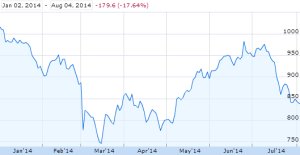History books are filled with examples of what can happen to investors under the direction of poor national governance. The real challenge is, once we are aware of poor governance, how do I respond as an investor?
Recent events have highlighted the potential for trouble in an investment portfolio. Commonly known as political risk, this may be any event triggered by a government’s executive, judicial or legislative decisions that has the potential to negatively affect the stock or bond holders of that country.
As international investing has become broader and more accessible to investors, these issues have become front-and-center questions for the average investor. A recent Economist article sought to quantify the impact of “bad governments” on that same nation’s investors, and cited some specific examples (Argentina, Iran, and Russia in this research) to study their impact relative to their global peers.
From a broad perspective, such judgment is related to how a government is perceived to honor the property rights of investors. For example, if there is a disagreement or conflict, whose rights are more important? Will the property of the government have priority over private owners? Do local owners have priority over foreign ones?
Even the actions of the controlling central bank may come to question. Similarly, are they interested in promoting a stable monetary policy, or are their other objectives that are considered more important? Often, the reliability of statistics (employment, inflation, etc.) or political graft (the usage of an official position for personal gain, including corruption or embezzlement) are other problems that crop up.

For investors, we can see some quantification of this in the overall valuation and volatility of a market’s investments. For example, Russian stocks recently traded for just 5.2 times the average companies’ annual profits. This compares to a recent level of 19.59 times the average companies’ annual profits in the United States, or 12.5 times that of other companies in emerging market countries.
To really put this into perspective, we can clearly see countries with similarly perceived policies continually trade at similar discounts. If we used the average levels of other developed or emerging market countries as a benchmark, we can see that they consistently trade at a discount of 50-60% relative to their peers. In other words, a lot of trouble is already “built-in” to the price of those assets trading in countries with poorly perceived governance.
Given the particularly unpredictable nature of politics, we never really know what direction such policies can go. A previously stable country may become more “unstable” by this measure, or one persistently considered unstable in the past may appear to be improving. The markets certainly adjust, over time or promptly, as necessary to reflect new information.
The greater the probability of instability, the greater potential that the country already weights low in global stock and bond indices. For example, Russia only makes up 0.60% of the MSCI All Country World Index, Greece makes up just 0.10% and Argentina and Iran don’t have any holdings in most such indices.
In other words, instability in these areas won’t amount to much more than a rounding error for the average diversified investor. An investor may spend significant energy trying to avoid such regions for investment, but their effort is likely to be more effective elsewhere. If, by chance, they own such investments via a broad-basket of global stocks, and these countries’ prospects improve through better policies, such investors would see that allocation appreciate in value relative to other investments.
So, we may worry about conflict (economic or otherwise) in certain areas for non-financial reasons regularly, but as it relates to your investment decisions, sticking to widely (and academically supported) approaches may be where you’re most likely to see success in investing.
Author: William A. Callahan, RLP, CFA, CFP®
William founded Callahan Financial Planning and previously served as President of the firm.


